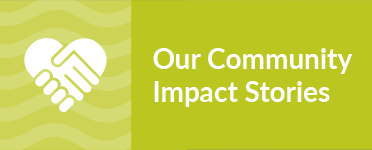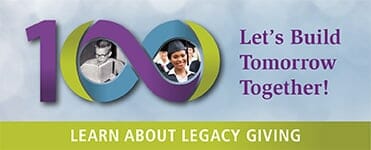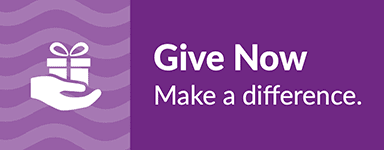Grants: Frequently Asked Questions
PLEASE NOTE: As of July 2025, we have made important changes to our grantmaking process, including changes to our timeline. We encourage you to carefully review the FAQs below for detailed information and to ensure proper planning and timely submission.
Please contact a member of our Program team (contacts listed below) if you have more specific questions about your grant application and any impact on your important work.
Grant Round Changes Beginning Fall 2025
Why are the grant rounds changing?
At the heart of our work is a deep commitment to strengthening the nonprofits, leaders, and communities we serve. Over the years, we’ve listened closely to our partners, reflected on our own practices, and asked the hard questions: Are we creating the conditions needed for trust, effective collaboration, and measurable impact? Are we using our time and yours wisely? Are we setting ourselves up to work well together and deliver the kind of impact this moment demands? With these questions in mind, we are making intentional shifts in our grantmaking process.
We are streamlining applications and reporting, making grants more sustainable, and removing unnecessary administrative hurdles. This isn’t about doing less; it’s about doing more of what matters most.
By making the process more efficient, we’re opening new opportunities:
- Opportunities for nonprofits to focus on what drives impact.
- Opportunities to build stronger, more aligned partnerships.
- Opportunities for our staff to engage more meaningfully.
At Connecticut Community Foundation, we believe in strategic philanthropy that supports long-term resilience and bold collaboration. Our updated approach allows us to invest more deeply in people and ideas, not just proposals and forms.
How will changes in the Foundation’s grant rounds impact my organization’s ability to receive a grant?
Our updated approach enables us to focus more deeply on people and ideas rather than paperwork and proposals. The decision-making process will remain the same; however, the grant timeline will be adjusted as Building Equitable Opportunity, Health and Environmental Justice, and Pathways for Older Adults will now be offered once a year. Additionally, the Foundation will continue working to streamline the application and review process for our nonprofit partners (including a shorter grant application form and continuation of interim conversations with grantees in lieu of formal progress reports).
Will these changes impact dollars available in any given funding area, or the size of the average grant awards?
No. These changes will not affect the total dollars available in any funding area or the size of average grant awards. Our commitment to investing in our community remains steady and unchanged.
How long will it take for funding decisions to be made? When will I know if my project was approved or denied?
Decisions will be made within three months of the grant deadline. Staff will reach out at the end of our funding cycle to let you know if the request was approved or denied.
Will these changes impact the timeline for grant reports?
No. Reporting will continue to be based on your project timeline. If you plan on re-applying for funding, it is the responsibility of the applicant to submit their final report before the next grant round opens up.
Should my organization do anything in advance of these changes? Are there any considerations we should keep in mind?
Please update your grant calendars and plan ahead for the upcoming rounds. If you have any questions or concerns, please don’t hesitate to reach out to a program officer to set up a conversation.
Eligibility:
How do I know if I qualify to apply for funding?
We support 501(c)(3) nonprofit organizations and organizations with a fiscal sponsor who support communities living in 21 towns within Greater Waterbury and Litchfield Hills. For further information visit our Grantmaking Overview.
What if my organization doesn’t have 501(c)(3) status?
We will consider requests from charitable programs that have a 501(c)(3) organization serving as a fiscal sponsor. The organization serving as the fiscal sponsor must demonstrate solid fiscal and administrative capability. A signed agreement between the two entities must be submited to the Foundation.
What if my organization is based outside of the region that the Connecticut Community Foundation serves, but our project focuses on and has participants that live in the region?
The Foundation offers support to organizations outside of our service area if the project is focused on impacting residents in our 21-town region. If you are applying for a grant as a statewide agency or for a statewide program, please include detailed information in your application about the number of people served and the intended outcomes and impact that will happen within our service area. It is also important that any organizations out of our region establish connections and develop partnerships in our community so that the work is informed by residents of our towns.
There are various community foundations serving Connecticut. If you are interested in learning more about these funders and which towns they serve, please click HERE.
Is it worthwhile for us to apply for a grant when I was previously denied?
This may depend on various circumstances such as the amount of time that’s passed between requests, reason specified for denial, resources currently available, etc. Please contact the relevant program officer to discuss potential re-submission.
Do you have an anti-hate grant policy?
Yes. Connecticut Community Foundation will not accept funds from donors or make contributions to grantees that the foundation believes, in its sole discretion, are intended to support or engage in hateful activities, whether online or offline. To view the foundation’s anti-hate policy, click HERE.
Types of Requests:
Does my project fit the Foundation’s funding priorities? How do I choose a priority area for an application?
Our website is the best place to start learning about our funding priorities. Deadlines and guidelines for all of the grant programs can be found HERE. You are also welcome to contact staff to discuss the most appropriate fit for your request.
Can I submit a proposal for equipment?
Grants for equipment-only are limited, although sometimes program-related equipment is included as part of a program grant request. As such, please discuss your specific equipment needs with us before submitting a request, and be sure to include at least one bid or quotation with your proposal.
Grant proposals for organizational technology projects are also accepted through our Strengthening Nonprofits grant.
Can I submit a capital campaign request?
Yes, although support for capital campaigns is limited. Please discuss with a member of our program staff prior to submitting a funding request.
Can I submit proposals for organizational development work?
Yes. All organizational development requests can be submitted to our Strengthening Nonprofits Grant. Proposals can include, but are not limited to, strategic planning consultants, fundraising assistance, new technology, one-on-one coaching, work focused on diversity, equity, and inclusion, and other projects designed to help build organizational efficiencies and increase overall effectiveness.
How many proposals can I submit in a grant round?
Typically, organizations may submit one grant proposal per priority area per grant round. If you would like to submit more than one proposal within a priority area, please discuss it with our Program staff first.
Can I apply for funding outside of the Fall and Spring grant periods if it is an urgent request?
Yes. There may be limited discretionary funds available that can be explored. We highly encourage a conversation with a program officer about this type of request.
What is a grassroots grant?
A grassroots grant is a grant available for Waterbury residents who would like to make positive neighborhood change. Applicants do not need to have 501(c)(3) nonprofit status and can use a fiscal sponsor (see eligibility section above for more information on fiscal sponsorships). Learn more about our Grassroots Program by reviewing the grant guidelines.
Grant Amounts and Budgets:
What is the average grant amount?
The average amount is between $5,000 and $15,000. Grants for larger amounts can be considered. However, for those, please contact our staff to discuss the project in advance of submission.
What kinds of items can be included in the budget?
Direct Costs: These expenses are directly related to completing the grant deliverables. They may include staff time, equipment or materials, marketing, or outside services required.
Indirect Costs: These are overhead expenses. They may include rent and utilities, general and administrative expenses, and publicity and fundraising.
The foundation typically funds direct costs. Organizations are also encouraged to include indirect/overhead expenses, and the budget allows for a flat 10% for this purpose (it may be higher, with additional explanation).
Decision-Making Process:
Who decides the approval or denial of grant requests?
At Connecticut Community Foundation, we believe that people who live in and reflect our region are best positioned to identify meaningful solutions to the issues facing our community. Additionally, we rely on the expertise of our staff who often live in the community, are familiar with the needs, and have long-standing relationships and partnerships with our grantees. Our grant decision process acknowledges both the value of our community and our staff. Volunteer community committees are made up of local residents and community leaders who review applications and provide recommendations. These committees are guided by our program staff and chaired by members of our board of trustees. Final decisions are made by the Foundation’s board of trustees.
Is it likely that we could be funded for 100% of the cost of a proposed project?
It is possible, especially if it is a smaller project. However, given the foundation’s finite funding resources, additional funds and in-kind contributions from other donors or organizations are often necessary to complete the project budget, especially with larger efforts. If you have questions about the size of your request amount, please reach out to a program officer to discuss your project.
When will I hear about the status of my application? If approved, how soon will funds be dispersed?
The foundation will notify grantees within a week of final board decisions. Funds will be dispersed via check or electronically (ACH) usually within the same week the award is officially accepted by the grantee. Typically, the grant process takes an average of three months to complete.
Creating a Grants Account and Application:
How do I create a grants account?
Connecticut Community Foundation uses an electronic grant application system called GOapply. Find details for getting started in GOapply in our user guide and through our instructional videos.
- If you have not yet created GOapply account, you will need to create one HERE.
- Registration requires verification and approval.
- Login with your email. A “Forgot Password” link is available if you are having trouble logging in.
- If you need any assistance with the GOapply portal, contact grants@conncf.org.
Where can I find funding opportunities and applications?
Once your registration has been approved, login to GOapply and select the Opportunities tab to view a list of funding opportunities currently available.
Click the ‘View’ link to select a funding opportunity. From within the application page, click the ‘Apply’ button to begin an application.
Are sample applications available?
Yes, sample applications are available HERE. We encourage you to review samples in preparation to complete the applications online.
Can I save my application if I need to complete it at a later time?
Yes, you can manually save your application at any time by clicking the ‘Save Draft’ button on the bottom left of your screen.
IMPORTANT: If you are stepping away from your computer, be sure to manually save before you leave. Otherwise, the website will eventually time out, which may cause you to lose completed information on the current page.
Can multiple people in my organization contribute to our grant application?
Yes, multiple people in your organization can register in GOapply and work together to complete a grant application. Registrants will be linked to your organization account and will be able to share access to draft applications and view past applications submitted through GOapply.
Reporting on Grants:
How and when do I submit a grant report?
Details on grant reporting are outlined in your grant decision letter.
Please submit reports through the GOapply portal.
- User Guide for GOapply portal.
- Login with your email. A “Forgot Password” link is available if you are having trouble logging in.
- Additional details can be found HERE.
- Please contact grants@conncf.org with questions or for assistance.
Getting More Information:
Can I speak with someone at the Foundation for more support?
Certainly! We encourage an initial conversation with one of the Program staff (listed below) to explore potential grant requests. This conversation can help to determine your organization’s eligibility and to learn more about the foundation’s priority areas, including which one would be most appropriate for your request.
Not all inquiries move beyond this initial conversation. Requests that are discouraged at this stage will be notified of the reasons for discouragement. In some cases, staff may be able to direct you to other resources.
Program Staff at Connecticut Community Foundation:
- Josh Carey, Director of Grants Management: Arts and Culture; Building Equitable Opportunity; Pride in the Hills Fund; Southbury Community Trust Fund; scholarships.
- Francesca Evangelista, Program Officer: Pathways for Older Adults; Health and Environmental Justice (Including Herbst Eye Research Fund); Saunders Fund for the Sick and Infirm of Naugatuck.
- Josh Feliciano, Program Assistant: General information on grant requirements; technical support with applications and reporting; overall administrative support for program team.
- Patrick McKenna, Senior Program Officer: Organizational capacity building initiatives; Strengthening Nonprofits grants; Grassroots Leadership; Ion Bank Foundation; Women’s Fund; McMillen Fund, Whittemore Travel Scholarship.
- Yadira Perez, Director BRASS Program: Director of older adults program, BRASS, in Waterbury.
- Tallitha Richardson, Scholarship & Collective Giving Program Officer: Scholarship information; Grassroots Leadership, Whittemore Travel Scholarship, general information about the Foundation’s Giving Circles.




